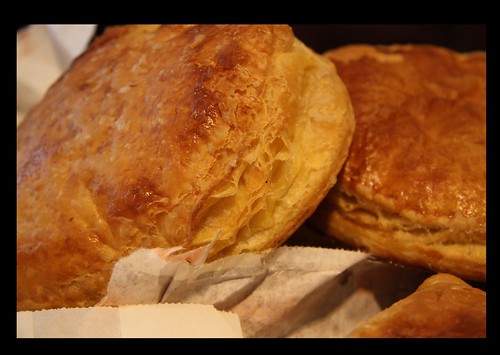gourmet greek
Meteora, Greece

Being on a limited budget with lots of mouths to feed means eating out in Europe is a rare occurrence for us (or it means you buy one tiny cheesecake and each enjoy a taste), and cooking for yourself means that you don’t get to experience local food quite the same – although we are always taking note of what people are eating as they wander the streets, sit outside cafes at various times or open up picnics at the park. Stopping at proper camping places (where other people also stay) usually gives us a better peep into local food habits – both the *what* they eat and *when* they eat it – than when we’re parked alone. But although we haven’t stayed anywhere official in Greece yet, we are starting to get a feel for the food. It would seem men sit at cafes in the morning eating pastries and drinking either a hot coffee or cold milk from a carton (actually they seem to do this All Day Long while the women converse their way around town with bundles of leafy greens, purple eggplants and plaited strands of garlic in their arms).
We have sampled our own fair share of pastries – at any time of day – and so far they’ve been uniformly amazing. The pastry is light and flaky, a crunchy and simultaneously melt-in-your-mouth paradox. The fillings include anything from feta cheese or gouda or ham and gouda or spinach or rotisseried meat to the delicious sweetness of cherries. They are also reasonably inexpensive.



By dint of doing our purchasing in local shops, our food is automatically local – we made an effort to buy baguettes in France and you can see we’re doing pastries in Greece (too bad the pastries were so expensive in France or we’d have more of them there too!) As far as buying local ingredients goes, our main problem is that we often do not know *how* a particular product is used. But what we lack in certainty we make up for in ingenuity.
Unfortunately we have not been able to work out how to make – without an oven – the baked goods seen on every restaurant menu we have stopped to peruse. In the absence of such essential equipment for the manufacture of moussaka and pastitsio, we may yet have to venture into a cafe or ubiquitous grill house (OK let’s be honest, that’s a plan set in concrete…as is the sampling of souvlaki and gyros at least once!)
Aren’t they delicious words? Moussaka, a rich combination of eggplant, meat sauce and tomatoes, all topped off with a thick cheese sauce. Pastitsio, not unlike a lasagne, but with pasta shapes instead of sheets. Doesn’t souvlaki sound better than skewered kebabs? And the pita bread filled with shavings of vertical rotisserie grilled meat and a dollop of tzatziki (another tasty word, don’t you think?) earnt itself a place in our stomachs hearts in Vietnam (there they called it “Turkish”, but let’s face it, the two countries are neighbours so it’s not surprising they share food traditions.)
A cursory glance at the Greek kitchen reveals a simple cuisine. I do not mean that with any sense of *lack* – rather that it offers a clean, largely unembellished taste of freshness drizzled in good quality (they would say the world’s best) olive oil. Herbs and spices are used sparingly – just enough to add a hint of accent to a food, not to overpower or shock (so different to Laos where every dish is filled with fresh chillies and dried chilli powder and eaten with chillies dipped in chilli paste!)
The simplicity of tzatziki and Greek Salad is hard to beat, a real Greek salad, that is (not a bed of lettuce that masquerades as a Greek salad by the addition of crumbled feta and olives!) The other night we made both.

If you have cause to feed a dozen people you’ll need for the tzatziki….
2C thick Greek yoghurt
10 cloves of garlic, crushed
½ cup cucumber, chopped or grated (and juice squeezed out)
1 tablespoon olive oil
2 teaspoons lemon juice
1-2 tablespoons fresh mint or dill, chopped (optional)
Mix together (not tricky eh)
And for the salad….
9 tomatoes, cut in wedges
3 cucumbers, sliced
1½ green capsicum pepper, sliced
2 or 3 red onions—sliced into rings
30 olives
3 tablespoons capers
Place in a bowl, sprinkle with salt, stir and taste.
3 tablespoons vinegar
9 tablespoons extra virgin olive oil
Whisk together in a small bowl and pour over the salad.
450g feta cheese, sliced thickly in chunks
1½ teaspoons dried oregano
Place the cheese on top of salad and sprinkle the oregano over
Salt, pepper
Season as desired and serve with freshly baked bread
Oh yes, the bread.
Apparently the traditional Greek bread is dark brown. But bowing to the wishes of the Athenian middle class, the standard has recently become white. Pity. But then again, this Greek white bread is unlike any other we have sampled; the crust is crunchy without being hard and the dough inside is miraculously both soft and substantial, almost like a brown bread. This Wholewheat Fanatic was almost converted to the cause of refined flour….but after trying a real sourdough brown loaf, her suspicions that it would be even better still were confirmed!
Loaves come in small and large batons, big and little round loaves, or a number of bread rolls baked together to resemble a flower. Bread dough is also transformed into thin snacky seed-covered dry-looking sticks and surprisingly *not* dry sesame-seed covered rings. A handful of grapes, a hunk of cheese and one of those makes a handsome lunch.


Perhaps the biggest difference we’ve noticed between the kiwi and greek kitchens can be found in the concept of MEZE. Not an appetiser, not a meal course, it is a series of small plates of little tidbitty things (or even something as hearty as a stew, but only a small portion) all plonked on the table to be shared by one and all – with a bottle of plonk. The emphasis is on the (some might say stereotypic) loud talking and having a good time. The food is simple and tasty.
POSTSCRIPT: I had written this piece a few days before posting it. We have now eaten out. A big fat Greek Mama made us a real Greek salad and potatoes and her even bigger fatter son grilled us chicken over the fire…. When we enquired about moussaka he insisted, “No Greek man food moussaka, only tourists.” We’re not sure if that’s because *they* don’t serve it or if Greeks truly do not eat it. We’re still on the lookout all the same <wink> He did, however, give us pomegranates and figs straight from the tree. That’s perhaps about as Greek as you get.

Tags: 2008/09, food, money, postcard: Greece, tradition




Leave a Reply